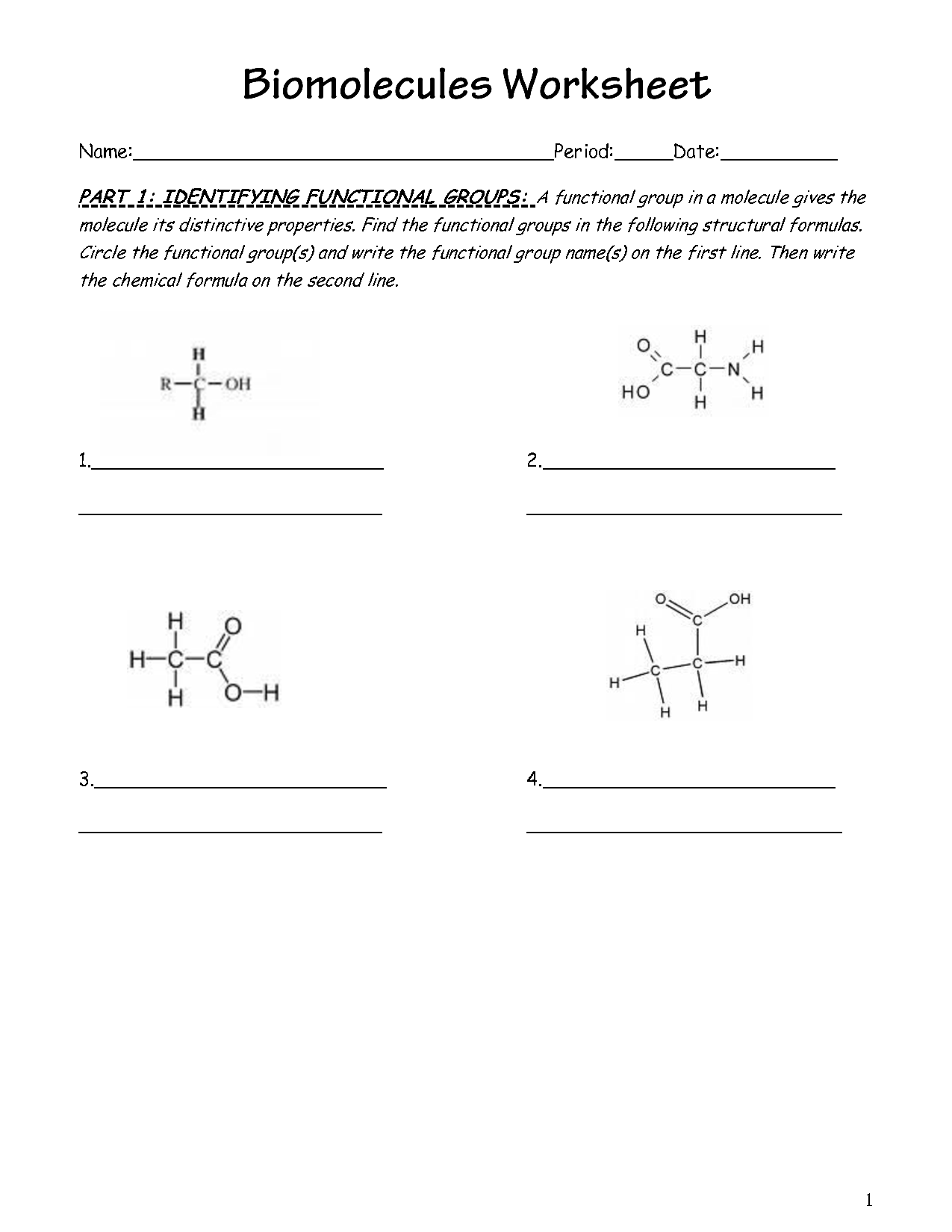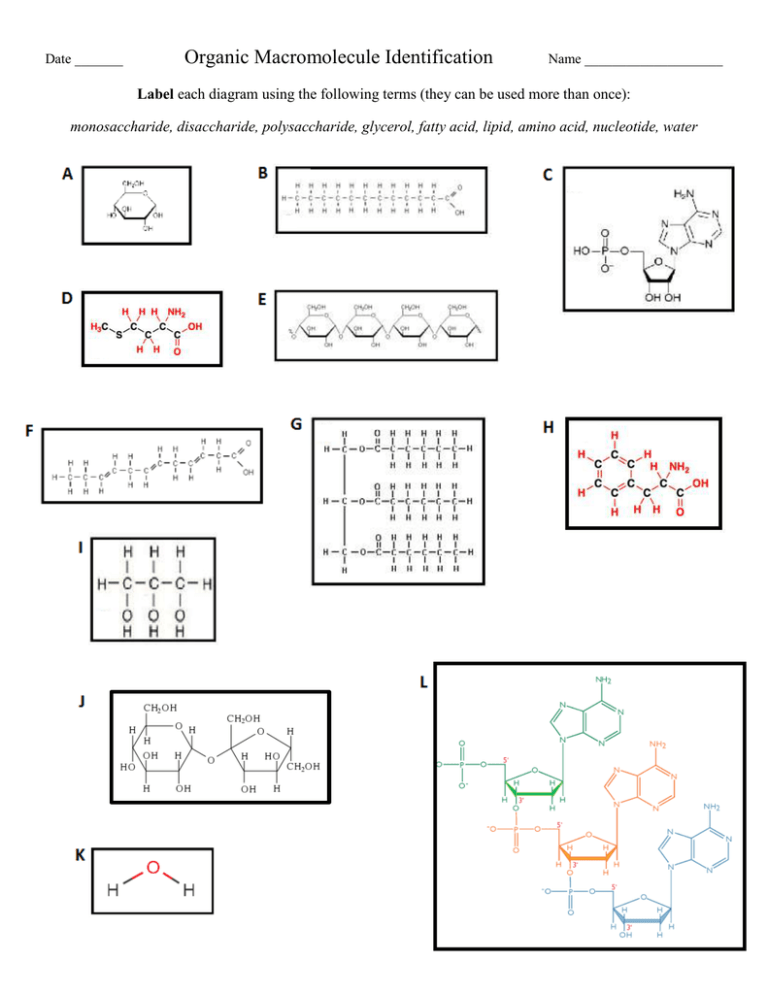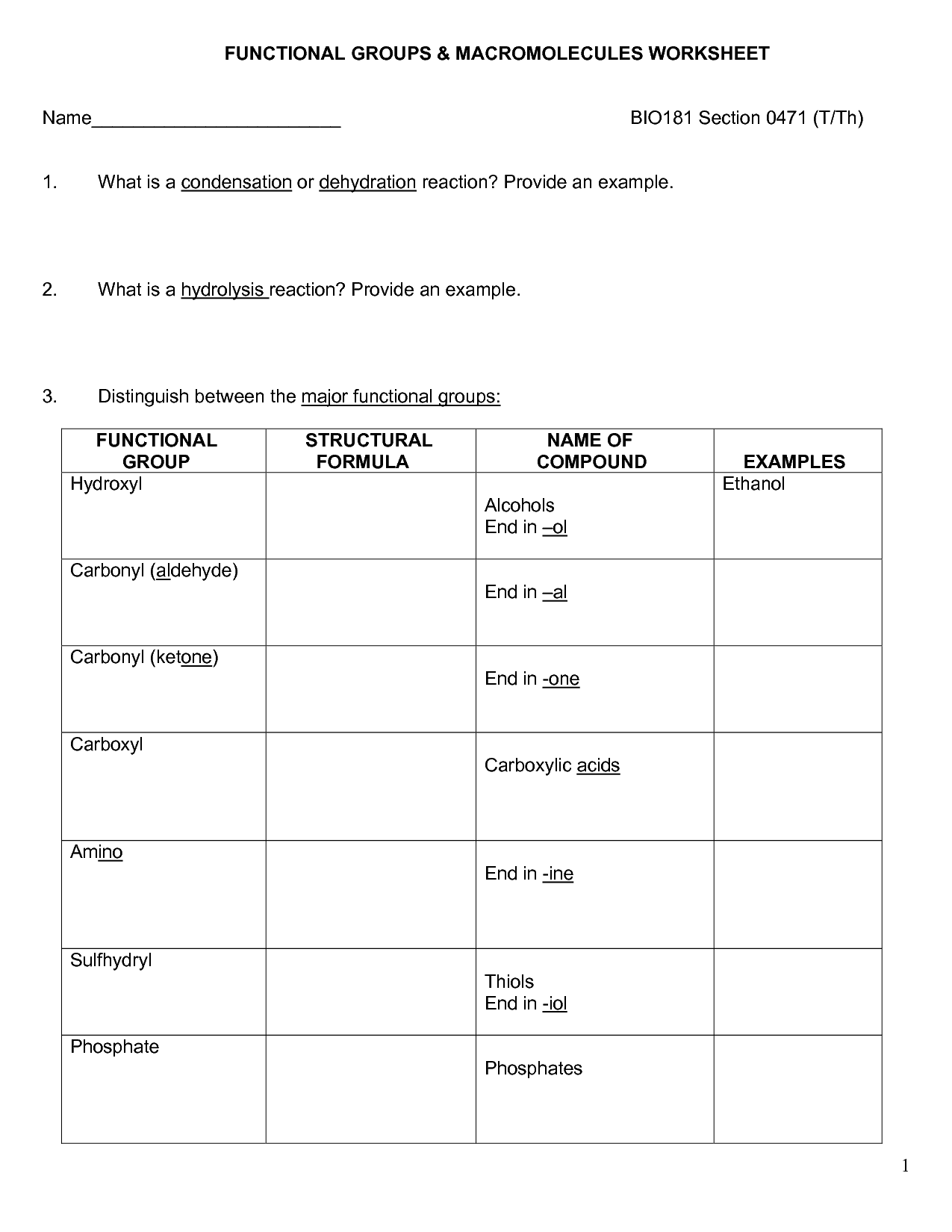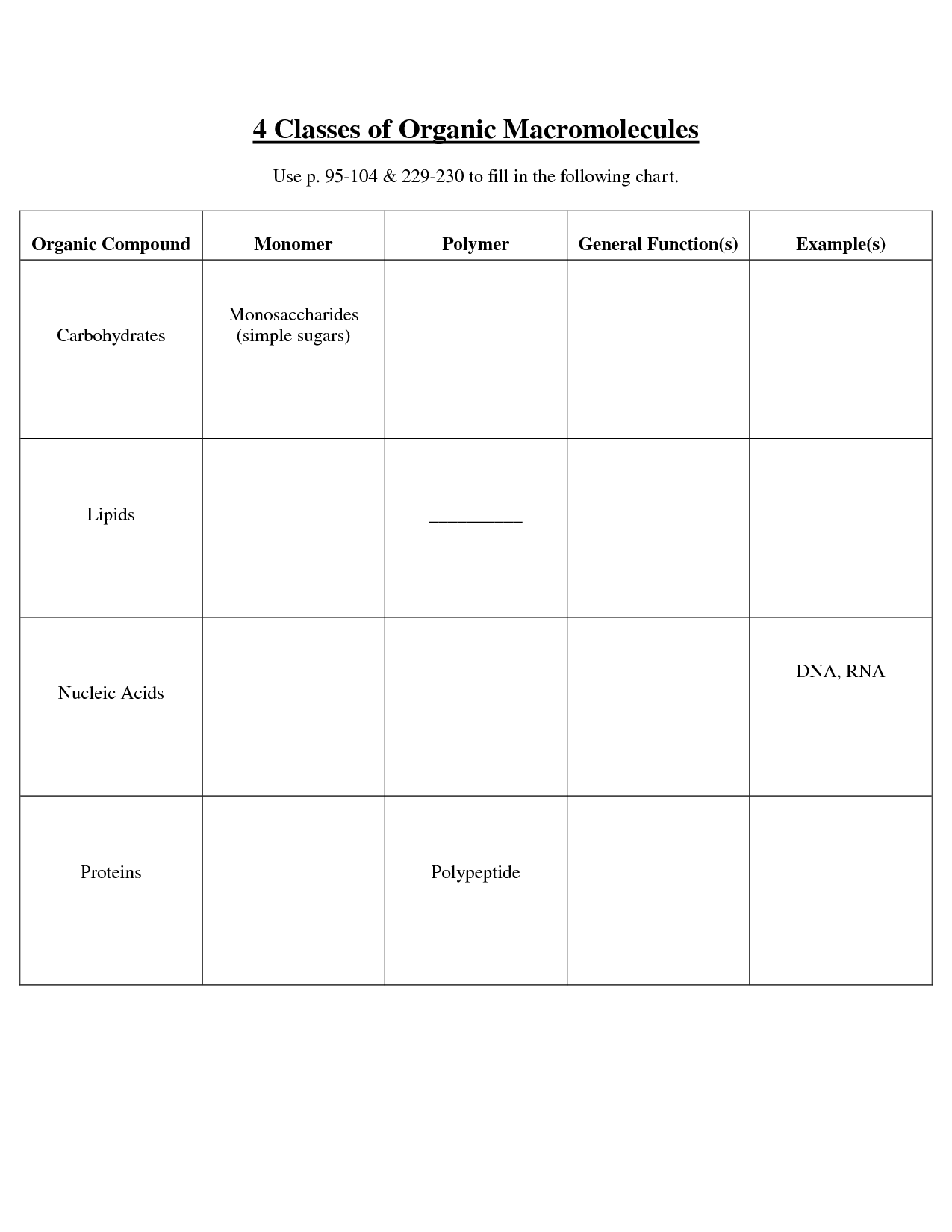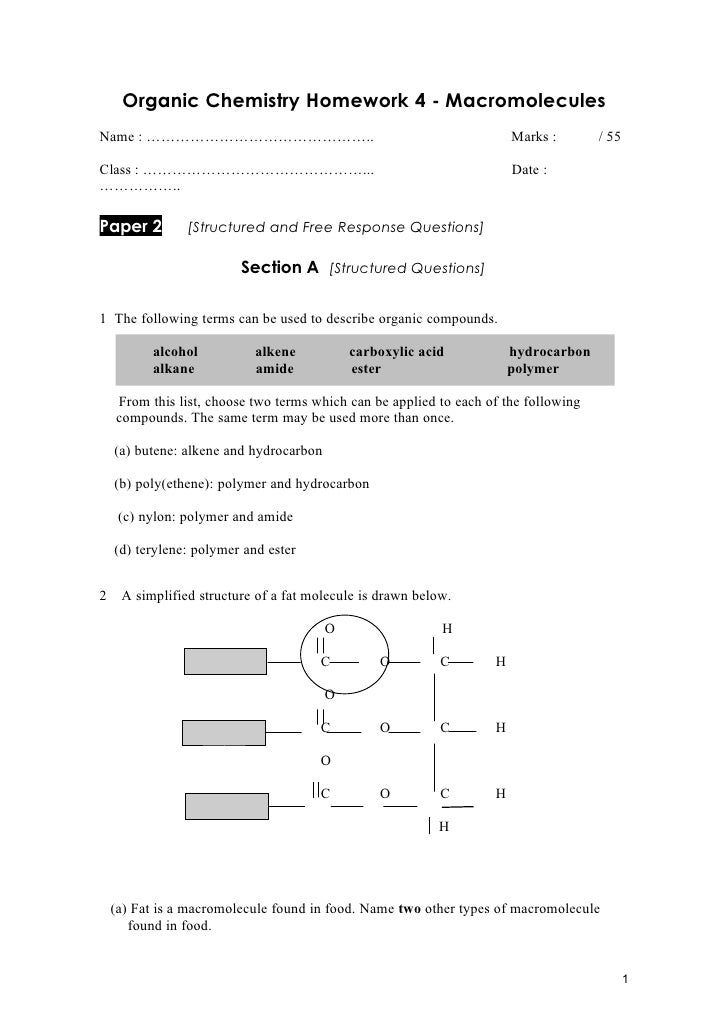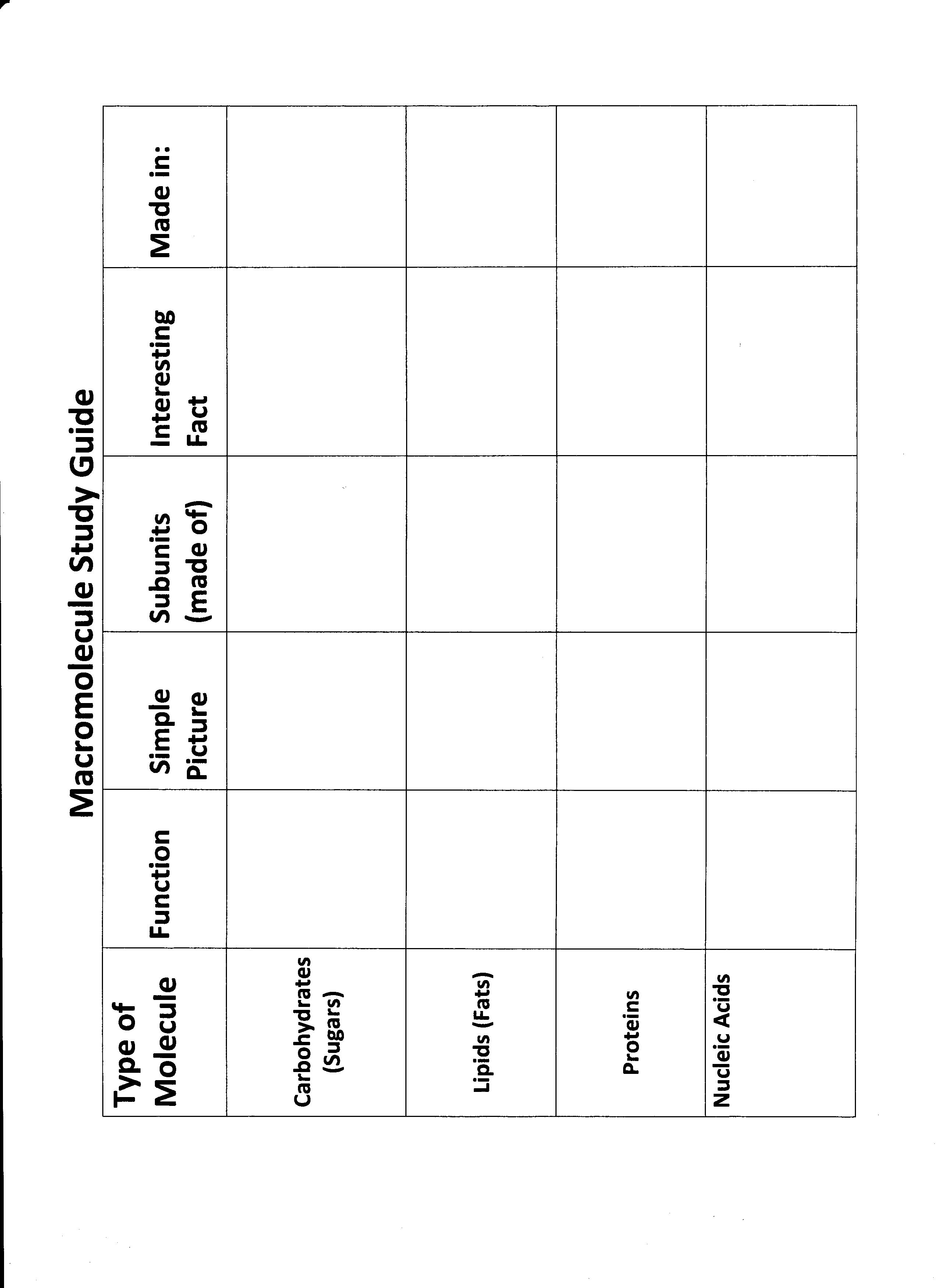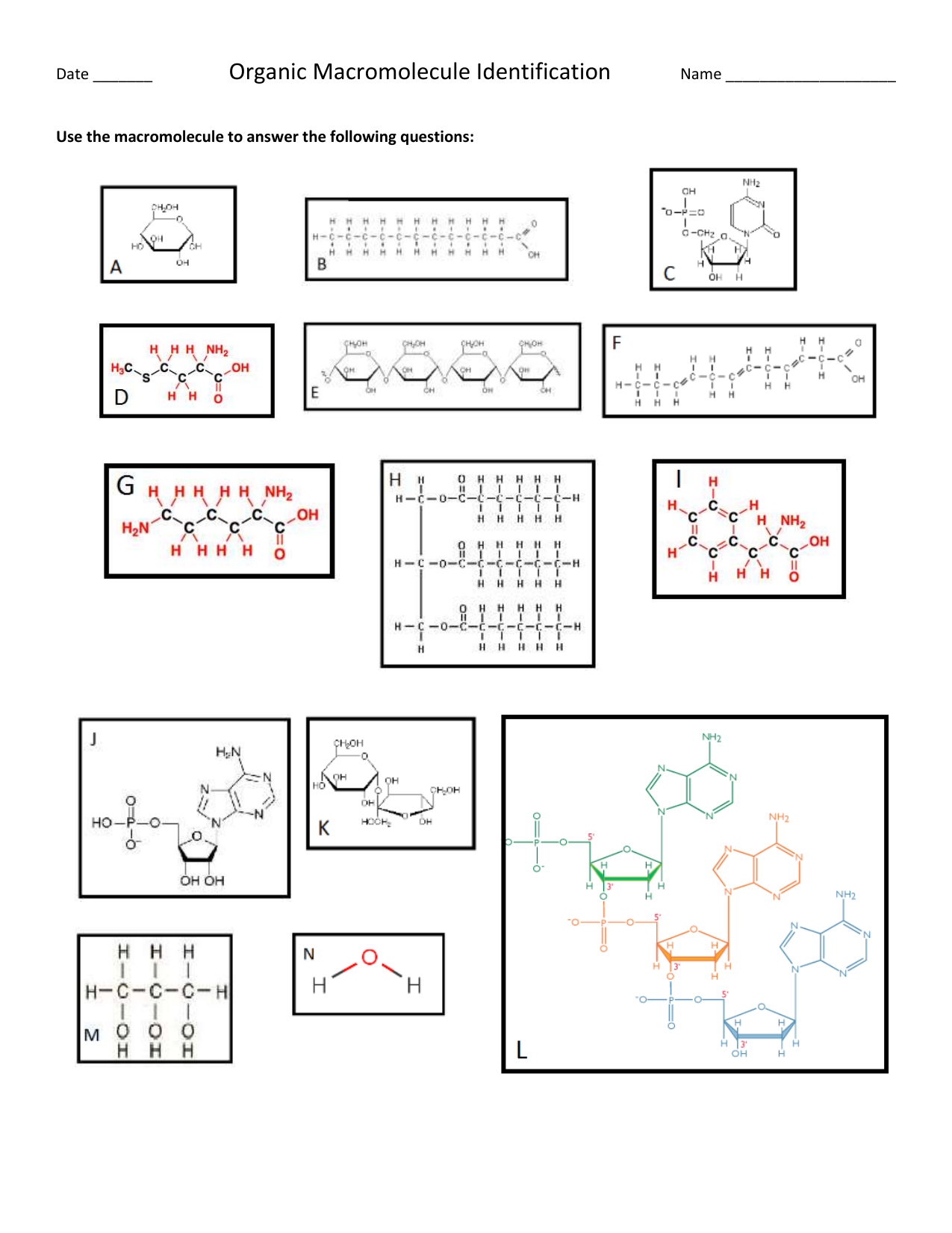Organic Macromolecules Worksheet
Organic Macromolecules Worksheet - For example, a piece of human liver contains 80% water, 12% protein, 5% fats, 2% nucleic acids, 1% carbohydrate and less than 1% of other substances. Live worksheets > english > chemistry > organic. Their molecular weights can range from the thousands to the millions. Neither, but is a key component of a lipid glycerol 4. One page worksheet as a pdf file with answer key.use this post after showing students my macromolecule ppt for practice identifying the monomers, polymers, and macromolecule types. _____ 3) what are the three types of carbohydrates? Web this worksheet reviews monomers and polymers of the 4 types of macromolecules (proteins, nucleic acics, carbohydrates, and lipids). Many organic molecules are assembled from small repeated units. 1) what atoms make up carbohydrates? Their structure, their chemical behavior, and how they can combine to form chains. Web macromolecules review worksheet for h biology part a. 1) what atoms make up carbohydrates? Practice name date period (flanomets and (foélmeu (worksheet action. Web learn more about different types of sugar molecules: Why is it so important to our daily functioning?, carbohydrates name of process resulting in disaccharide formation? Web learn more about different types of sugar molecules: Quiz & worksheet goals use these. They are life‟s building blocks. The process of monomers join together to form polymers. Why is it so important to our daily functioning?, carbohydrates name of process resulting in disaccharide formation? Carbohydrates, lipids, , nucleic acids). Quiz & worksheet goals use these. Large compounds built from smaller compounds called monomer. Web organic molecules are the molecules which exist in all living things. Web macromolecules are very large molecules. Many organic molecules are assembled from small repeated units. Web included in this post: Many organic molecules are assembled from small repeated units. Typically they are constructed from small, repeating units linked together in some way. What other component is required?. A variety of question types are used including matching, multiple choice, fill in the blank, and short answer. Live worksheets > english > chemistry > organic. _____ 2) what is the ratio of hydrogen to oxygen atoms present in all carbohydrates? Many organic molecules are assembled from small repeated units. Web this worksheet reviews monomers and polymers of the 4. Classify each as a carbohydrate, protein , or lipid. A variety of question types are used including matching, multiple choice, fill in the blank, and short answer. Glucose + glucose = maltose) c. Describing the molecular weight of a polymer is not as straightforward as it is in a small molecule. Web this worksheet reviews monomers and polymers of the. Practice name date period (flanomets and (foélmeu (worksheet action. Web organic worksheets and online exercises. Neither, but is a key component of a lipid glycerol 4. Glucose + glucose = maltose) c. Can be used in class for practice or as homework after a lesson on the 4 classes of macromolecul. Web this quiz will test how well you understand the difference between organic and inorganic molecules, as well as the basic definition of a macromolecule. Web organic macromolecules organic compounds are those that contain carbon (e.g. The smallest unit of matter. 1) what atoms make up carbohydrates? Web this worksheet reviews monomers and polymers of the 4 types of macromolecules. Concept maps are a great activity to strengthen your students' understanding of the content being taught. For example, a piece of human liver contains 80% water, 12% protein, 5% fats, 2% nucleic acids, 1% carbohydrate and less than 1% of other substances. Small compounds that bond together to form polymers. The process of monomers join together to form polymers. Describing. Building macromolecules the structure of organic molecules Carbohydrates, lipids, proteins, and nucleic acids. The process of monomers join together to form polymers. How are organic molecules related to all living things? Live worksheets > english > chemistry > organic. Web organic macromolecules organic compounds are those that contain carbon (e.g. Organic molecules have four common characteristics. How are organic molecules related to all living things? What other component is required?. First, they are all carbon based, meaning they all contain carbon. A variety of question types are used including matching, multiple choice, fill in the blank, and short answer. Why is it so important to our daily functioning?, carbohydrates name of process resulting in disaccharide formation? Typically they are constructed from small, repeating units linked together in some way. Web this quiz will test how well you understand the difference between organic and inorganic molecules, as well as the basic definition of a macromolecule. _____ 3) what are the three types of carbohydrates? Web organic molecules worksheet 1) all organic compounds contain _____ carbohydrates: Building macromolecules the structure of organic molecules 1) what atoms make up carbohydrates? Web macromolecules are very large molecules. What are their functions in the body? Web organic macromolecules organic compounds are those that contain (e.g. Web organic molecules are the molecules which exist in all living things. All things are formed from these organic molecules. Practice name date period (flanomets and (foélmeu (worksheet action. Glucose + glucose = maltose) c. Concept maps are a great activity to strengthen your students' understanding of the content being taught. _____ 2) what is the ratio of hydrogen to oxygen atoms present in all carbohydrates? Web learn more about different types of sugar molecules: First, they are all carbon based, meaning they all contain carbon. Web study with quizlet and memorize flashcards containing terms like carbohydrates four important roles of carbohydrates, carbohydrates most common monosaccharide? In addition, you will learn several methods of detecting carbohydrates and proteins in complex samples such as foods. The process of monomers join together to form polymers. Typically they are constructed from small, repeating units linked together in some way. Carbohydrates, lipids, proteins and nucleic acids. In what type of solvent are they soluble or insoluble? Part all macromolecules are polymers made up of monomers. How are organic molecules related to all living things? For example, a piece of human liver contains 80% water, 12% protein, 5% fats, 2% nucleic acids, 1% carbohydrate and less than 1% of other substances. The smallest unit of matter. All things are formed from these organic molecules. A substance that consists of only one type of atom.15 Best Images of Biological Molecules Worksheet Organic Molecules
Organic Macromolecule Identification
14 Macromolecules Review Worksheet Answer Key /
Organic Compounds Macromolecules Worksheet Answers Thekidsworksheet
12 Biology Macromolecules Worksheets /
Macromolecule worksheet
Organic Macromolecules Worksheet Organic Chemistry Reactions, Science
15 Organic Macromolecules Worksheet Answers /
Organic Macromolecule Identification Date _______ Name
Macromolecule Comparison Table Worksheet Answers Macromolecules
What Other Component Is Required?.
Can Be Used In Class For Practice Or As Homework After A Lesson On The 4 Classes Of Macromolecul.
Quiz & Worksheet Goals Use These.
What Is The Length Range Of A Triglyceride?
Related Post:

